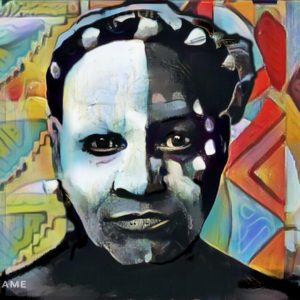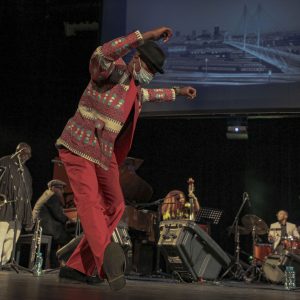Linda Tshabalala breathes artistry on ‘Convergence’
The alto saxophonist and composer’s debut record could well place her in the pantheon of jazz giants, standing tall as one of the lone female voices among the reed players.
Author:
13 July 2021

There’s a soft spirit of defiance and a set of adorations streaming steadily through the music of Linda Tshabalala. The jazz alto saxophonist and composer has finally released her debut album, Convergence: Bekezela Siyeza. It has taken years of quiet creative development and gestation, along with the spectre of mortality occasioned by the Covid-19 pandemic, to compel her to commit to finalising the project.
During a meandering telephonic interview, throughout which she is audibly busy with household chores, Tshabalala confides that “these are songs I’ve been hearing in my heart for years now. I had to get them out there.” Giggling as she makes light of another, more macabre, motivation behind the project, she says that a “moment of fear” gripped her during the first wave of Covid-19 during the winter of 2020.
“It was during the first lockdown when I suddenly felt like I could catch the virus and die. Then these dreams and songs would die with me. So I thought I needed to record [them]. Even if it’s the only album I ever get to release, at least the world will have heard me and my music.”
Related article:
Tshabalala put together a band of trusted session musicians: drummer Sphelelo Mazibuko, Gali Ngoveni on bass, Mongezi Conjwa on piano and Mark Komane on guitar, while Lesego Mokgatle and Ncamisa Nqana share the duty on vocals. They gathered at Sumo Sound recording studio run by drummer and engineer Peter Auret. It took a few weeks to lay down the 10 tracks, which are mainly compositions she had been working on as early as 2006.
They included an arrangement of Flowers of the Nation, a tune by Jonas Gwangwa. But Sony Music Publishing, which controls access to Gwangwa’s music rights, was “demanding crazy amounts of money for rights to record the song… They told me to take it down or they would sue me. What could I do?” she asks. Though the album may now be one song short of Tshabala’s initial vision, her music is no less fully realised.
Women with horns
Part of what makes Tshabalala’s long-anticipated rise special is that she is a woman with a horn. It’s remarkable also because the pantheon of jazz greats has so few female saxophonists of note, but she will be likely to join them.
Supremacy on the reeds is a hard-won accolade for anyone. This is in part because jazz music, as a soloist’s art, often operates like a combat sport: gruelling, highly competitive and severe in its demands from those who practise the craft. These are traits that often favour more masculine conditionings, and they also exemplify the prohibitive realities that come with gender in the workplace, which is something Tshabalala discovered early while trying to enter the scene.
“I was surprised. No one was interested in my explanations for why I didn’t check out the music enough before arriving for rehearsals,” she says. “As a mother, I thought the guys would understand when I’d explain that my child needed this or that. But no, these guys just picked up and played. They didn’t entertain my not being prepared for the gig. They simply left me to figure it out.”

However, she understood the trick is not to quit or become negatively affected. “It helped me grow to a point where I can exist in the industry professionally with all my soft femininity and not need to justify it, or try to be hard. I just became a better, stronger version of myself.”
Tshabalala is part of a new generation of women daring to flourish on the contemporary male-dominated global scene. For instance, in Rwanda, Stella Tushabe is emerging as one of the country’s first female saxophonists to get some real attention. She has chosen the alto, too. Elsewhere, there is the American Tia Fuller, an alto saxophonist, composer and music teacher who is also a member of Beyoncé’s all-female touring band.
Then there are notable tenors like Camille Thurman, who plays with the Jazz at Lincoln Centre Orchestra, and London’s Nubya Garcia, who has become an unignorable voice on reeds. There is also the Dutch star alto player and composer Tineke Postma who, like Tshabalala, feels closer to tenor players though chooses the alto as her primary instrument.
Related article:
“I love the lyrical side of the soprano,” Postma told an interviewer. “Yeah, I am attracted by the higher voices, but there are more tenor saxophone players I feel close to than alto saxophone players. It is funny. Tenor is an amazing saxophone, but alto is probably the hardest of the saxophone family. It is a challenge and I just love that.”
Tshabalala echoes this statement. “I feel more at home with the alto. I tried other saxes that didn’t work for me. It’s funny, because whenever people ask me who my deepest influence is, I always say John Coltrane. Then they always say, ‘Wow, but you don’t even sound like him.’”
However, on closer listening to her album, discerning music lovers can pick up a preference for melody, rhythm, timbre and emotion as opposed to chords as the centre of her approach to building songs. It is a modal approach that is at the heart of what made Coltrane powerful as an improviser.
Following past pathways
Jazz is a music that rewards reverence for tradition and respect for forebears. But young South African women who reach for the reeds have only a few voices to choose from. Among them are Lynette Maphantso Leeuw, who began her journey as a vocalist in the all-female singing troupe Randfontein Dolls before being introduced to the alto sax by producer Christopher Songxaka. After a first lesson lasting only two hours sometime in 1961, he decided to record her.
The marketing gimmick and sexist image of a “doll with a sax” led to others trying their hand as well. For instance, trumpeter Thabo Machele helped Patricia Ntlantla Nkomo, another member of the Randfontein Dolls, to find her way around the alto sax and she later started recording with Leeuw.
Like the heroines who came before her, Tshabalala found the alto saxophone by chance, as she was starting out as a student at Johnny Mekoa’s Music Academy of Gauteng. “One day, bra Johnny looked at me and said, ‘Ngwanaka nna, ga ke o shebile, ke bona a saxophone player (My child, when I look at you I see a saxophone player).’ So I picked it up and never turned back.”

It was a key moment in a journey that had begun at Sibikwa Arts Centre in Benoni on the East Rand, where she took instruction in piano and singing. She found her way to Mekoa’s school after seeing the academy’s big band perform on television. “I was still in high school when I saw those kids playing. I just knew I wanted to be a part of whatever they had going on.” So she petitioned her father Richard, a fervent jazz record collector, who tracked down the school and enrolled her.
Mekoa’s love and lessons sustain Tshabalala’s commitment to the academy to this day, and she continues to teach music theory and saxophone to its pupils. She wrote the tune For Bra Johnny, an airy, prayerful number, as an ode to the late great maestro who died on 4 July 2017. It sits well on her debut album, along with Edube, which pays homage to a street in Wattville where her maternal grandparents’ home is located.
The mbaqanga-rooted Vutha Jive is a celebration of Daveyton, the township where she began a journey that took her through four years at the University of Cape Town, where she pursued a degree in jazz performance. That was followed by a year at the Tshwane University of Technology, which she calls “the place I developed the most as a performer”. In 2013, she joined Thandiswa Mazwai’s all-female band.
In hindsight, all the experience and learning feel like she was biding her time, or holding her breath before blowing a perfect note into a converging groove. Perhaps she was simply learning to bekezela, to endure, like the songs she’s finally delivered on her debut record.


